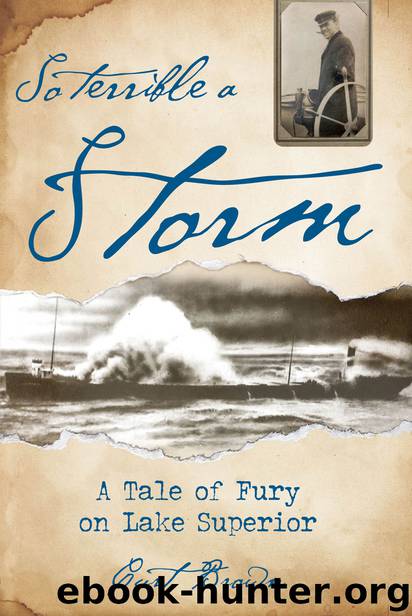So Terrible a Storm by Curt Brown

Author:Curt Brown
Language: eng
Format: epub
Publisher: MBI
Published: 2011-09-21T16:00:00+00:00
IX
“I did this on my own resolution. I received no orders from the Pittsburgh Steamship Company, or any of its employees, of any nature regarding my departure. I used my own judgment, as I always do in such cases.”
~ Notarized statement of Captain Dick Humble
December 1, 1905
Thanksgiving came to Duluth that Thursday with hundreds of stranded sailors drinking heavily. Their lot included the nine crewmembers of the Nasmyth, the barge that Captain Humble ordered to drop its towline. It had ridden out the storm, anchors clawing the lake bottom, and all had survived. Humble was sure he was casting the freight boat off into the devil’s hands. He would never have guessed the barge would fare better than his steamer, Mataafa.
Crowds continued to gather on the piers and at the morgue. Half-sunken and beached freights dotted the shore, from the sand-trapped England on Minnesota Point to the Crescent City resting in a safe cove five miles north in Lakewood. The Mataafa, angled just off the north pier, dominated everyone’s gaze and talk.
In the days that followed, sermons were delivered, a diver in a heavy suit and helmet searched the Mataafa’s sunken after chambers, and a chartered train spewing black smoke rattled into the Duluth depot. In its plush coach car, cigar smoke exhaled through the pug nose of Harry Coulby, the forty-year-old president of the massive merged fleet of the silver smokestacked Pittsburgh Steamship Company.
From the Madeira, which had sunk below the cliffs of Gold Rock, to the Crescent City to the Mataafa, the storm paralyzed Coulby’s Great Lakes armada.
The talk, naturally, turned to blame. Six men on the Mataafa were dead. Three were missing. Fifteen were sipping hot whiskeys under quilts on the third floor of the St. Louis Hotel. The whispering turned into arguments, ringing out at Lanigan’s pub, on the piers, and in the lines waiting to view the bodies at Flood and Horgan’s morgue.
When it came to pointing fingers, people were picking one of four corners. Most of the criticism’s sting was felt by Murdoch McLennan, the amiable, bear-sized captain of the U.S. Life-Saving Service in Duluth. Mataafa captain Dick Humble assumed as much of the blame as he could. Working people eyed Coulby, the English shipping baron from Cleveland who had busted unions, flexed his muscle for control against the vessel masters, and got rich in the process. Coulby, in turn, laid the responsibility squarely on nature, pure and simple.
And meteorologist Herbert Richardson could only shake his head as he analyzed his graphs and record-keeping apparatus.
The blips and lines of Richardson’s equipment told the same tale that all on the waterfront could see plainly with their own eyes. A sixty-foot gash had been torn through the sand bar harbor of Minnesota Point, cutting a wide, shallow new channel. Lighthouses and whistle houses had been wrecked. Timbers and coal were strewn on the piers and docks. Sand cribs that once helped form the breakwater, a hundred feet by eighty feet and thirty feet deep, were now slapped haphazardly on the beach.
Download
This site does not store any files on its server. We only index and link to content provided by other sites. Please contact the content providers to delete copyright contents if any and email us, we'll remove relevant links or contents immediately.
Man-made Catastrophes and Risk Information Concealment by Dmitry Chernov & Didier Sornette(6010)
The Revenge of Geography: What the Map Tells Us About Coming Conflicts and the Battle Against Fate by Kaplan Robert D(4076)
Zero Waste Home by Bea Johnson(3835)
COSMOS by Carl Sagan(3618)
Good by S. Walden(3549)
In a Sunburned Country by Bill Bryson(3537)
The Fate of Rome: Climate, Disease, and the End of an Empire (The Princeton History of the Ancient World) by Kyle Harper(3062)
A Wilder Time by William E. Glassley(2859)
Camino Island by John Grisham(2797)
Organic Mushroom Farming and Mycoremediation by Tradd Cotter(2689)
The Ogre by Doug Scott(2679)
Human Dynamics Research in Smart and Connected Communities by Shih-Lung Shaw & Daniel Sui(2500)
Energy Myths and Realities by Vaclav Smil(2488)
The Traveler's Gift by Andy Andrews(2458)
9781803241661-PYTHON FOR ARCGIS PRO by Unknown(2365)
Inside the Middle East by Avi Melamed(2352)
Birds of New Guinea by Pratt Thane K.; Beehler Bruce M.; Anderton John C(2254)
A History of Warfare by John Keegan(2240)
And the Band Played On by Randy Shilts(2200)
